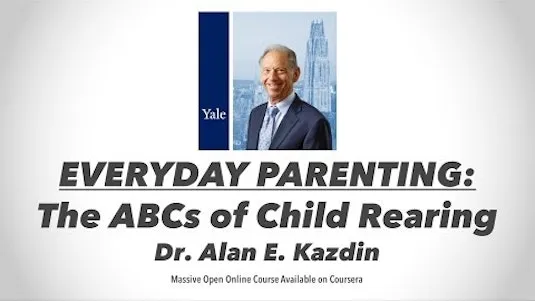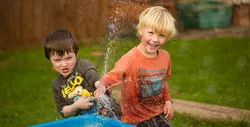
Everyday Parenting: The ABCs of Child Rearing 
This course, Everyday Parenting: The ABCs of Child Rearing, provides step-by-step instructions and demonstrations to help you develop the behaviors you would like to see in your child. Learn how simple modifications to tone of voice and phrasing can lead to more compliance, and gain insight into parenting misconceptions and ineffective strategies. Practice the techniques to reap the rewards and improve your effectiveness in changing your child’s behavior. Subtitles available in Chinese and Spanish. ▼
ADVERTISEMENT
Course Feature
![]() Cost:
Cost:
Free
![]() Provider:
Provider:
Coursera
![]() Certificate:
Certificate:
Paid Certification
![]() Language:
Language:
English
![]() Start Date:
Start Date:
17th Jul, 2023
Course Overview
❗The content presented here is sourced directly from Coursera platform. For comprehensive course details, including enrollment information, simply click on the 'Go to class' link on our website.
Updated in [May 25th, 2023]
Everyday Parenting: The ABCs of Child Rearing is a course designed to provide parents with a toolkit of behavior-change techniques to make their typical day in the home easier. Through step-by-step instructions and demonstrations, parents will learn how even simple modifications to tone of voice and phrasing can lead to more compliance. The course will also shed light on many parenting misconceptions and ineffective strategies that are routinely used. The key to the course is practice, as it is not enough to know the strategies; they must be done to reap the rewards. Subtitles are available in Chinese and Spanish. This course is ideal for parents who have any frustrations with their child or would like to improve their effectiveness in changing their child’s behavior.
[Applications]
The application of Everyday Parenting: The ABCs of Child Rearing can be seen in the everyday life of parents. By utilizing the techniques and strategies taught in the course, parents can learn how to modify their tone of voice and phrasing to lead to more compliance from their children. Additionally, the course can help parents identify and avoid ineffective parenting strategies. To ensure the best results, it is important for parents to practice the techniques taught in the course on a regular basis. The course is also available in Chinese and Spanish, making it accessible to a wider range of parents.
[Career Paths]
1. Child Psychologist: Child psychologists specialize in the study of child development and behavior. They use a variety of techniques to assess and diagnose mental, emotional, and behavioral disorders in children. They also provide counseling and therapy to help children and their families cope with difficult situations. As the demand for mental health services increases, the need for child psychologists is expected to grow.
2. Child Care Worker: Child care workers provide care and supervision for children in a variety of settings, such as daycare centers, preschools, and after-school programs. They are responsible for creating a safe and nurturing environment for children, as well as providing activities and instruction to help them learn and grow. With the increasing number of working parents, the demand for child care workers is expected to remain strong.
3. Parent Educator: Parent educators provide guidance and support to parents and families. They help parents understand their children’s development and behavior, and provide strategies to help them manage difficult situations. They also work with schools and other organizations to develop programs and resources to support parents. As the need for family support services increases, the demand for parent educators is expected to grow.
4. Early Childhood Educator: Early childhood educators work with children from birth to age eight. They provide instruction and guidance to help children develop socially, emotionally, and cognitively. They also create and implement activities and programs to help children learn and grow. With the increasing emphasis on early childhood education, the demand for early childhood educators is expected to remain strong.
[Education Paths]
1. Bachelor of Science in Child Development: This degree program focuses on the physical, cognitive, social, and emotional development of children from birth to adolescence. It covers topics such as child psychology, family dynamics, and child health. Students learn how to create and implement developmentally appropriate activities and programs for children. This degree is becoming increasingly popular as more parents are looking for ways to better understand their children and provide them with the best possible care.
2. Master of Science in Early Childhood Education: This degree program focuses on the educational needs of young children from birth to age 8. It covers topics such as curriculum development, classroom management, and assessment. Students learn how to create and implement developmentally appropriate activities and programs for young children. This degree is becoming increasingly popular as more parents are looking for ways to better understand their children and provide them with the best possible education.
3. Doctor of Education in Educational Leadership: This degree program focuses on the leadership and management of educational organizations. It covers topics such as school law, budgeting, and personnel management. Students learn how to create and implement effective policies and procedures for educational organizations. This degree is becoming increasingly popular as more parents are looking for ways to better understand the educational system and provide their children with the best possible education.
4. Doctor of Philosophy in Educational Psychology: This degree program focuses on the psychological aspects of learning and teaching. It covers topics such as cognitive development, motivation, and learning disabilities. Students learn how to create and implement effective strategies for teaching and learning. This degree is becoming increasingly popular as more parents are looking for ways to better understand their children’s learning needs and provide them with the best possible education.
Course Syllabus
The ABCs : Part 1 - Antecedents & Behaviors
Module 1 overviews the course structure and outlines the ABC formula for behavior-change programs. The “A” in the ABC stands for Antecedents and covers what to do before the behavior. The “B” represents Behavior and outlines working on the behavior itself - how to shape behavior by breaking it down into doable steps, practice the behavior repeatedly through simulations, and model the behavior. The course kicks off with a “C” (Consequence) because learning how to praise your child in the special way may be the most useful and versatile technique in the series.The ABCs: Part 2 - Consequences
Module 2 focuses on the “C” in the ABC formula which is what comes after the behavior such as praise, rewards, attention, or punishment.Advanced ABCs - Troubleshooting and Adolescents
Module 3 takes all the ABC techniques into consideration and outlines ways to improve and expand upon the parenting tools. Learn how to modify techniques for your maturing adolescent along with new techniques to foster communication with your child.Special Topics and Conclusion
Module 4 moves beyond the ABC techniques and considers the larger family environment, misconceptions that might hold you back from implementing an effective behavior-change program, helping your child in school, and warning signs that your child may need professional help along with tips on how to find viable treatments.Pros & Cons

Fast changes in child behavior.

Simple steps to build strong kids.

Positive behavior becomes manageable.

Additional skills needed for children with emotional regulation problems.

Some words in video transcriptions were wrong.

Health care system and psychologic help have done nothing.
Course Provider

Provider Coursera's Stats at AZClass
Discussion and Reviews
0.0 (Based on 0 reviews)
Explore Similar Online Courses

Create Your First NoSQL Database with MongoDB and Compass

Level I CFA Prep Course (2023) - Economics

Python for Informatics: Exploring Information

Social Network Analysis

Introduction to Systematic Review and Meta-Analysis

The Analytics Edge

DCO042 - Python For Informatics

Causal Diagrams: Draw Your Assumptions Before Your Conclusions

Whole genome sequencing of bacterial genomes - tools and applications

Childrens perspectives on play

Child Development & Pedagogy

Kids with Cancer Still Need School: The Providers Role
 Related Categories
Related Categories
 Popular Providers
Popular Providers
Quiz
 Submitted Sucessfully
Submitted Sucessfully
1. What is the key to the course?
2. What are the subtitles available in?
3. What will the course provide?


Start your review of Everyday Parenting: The ABCs of Child Rearing